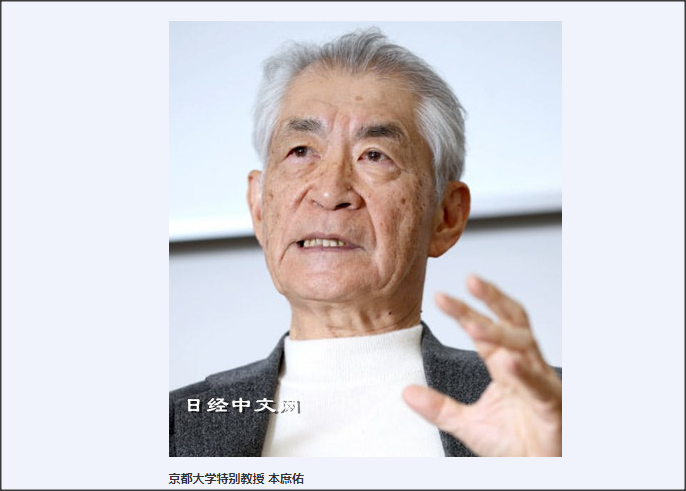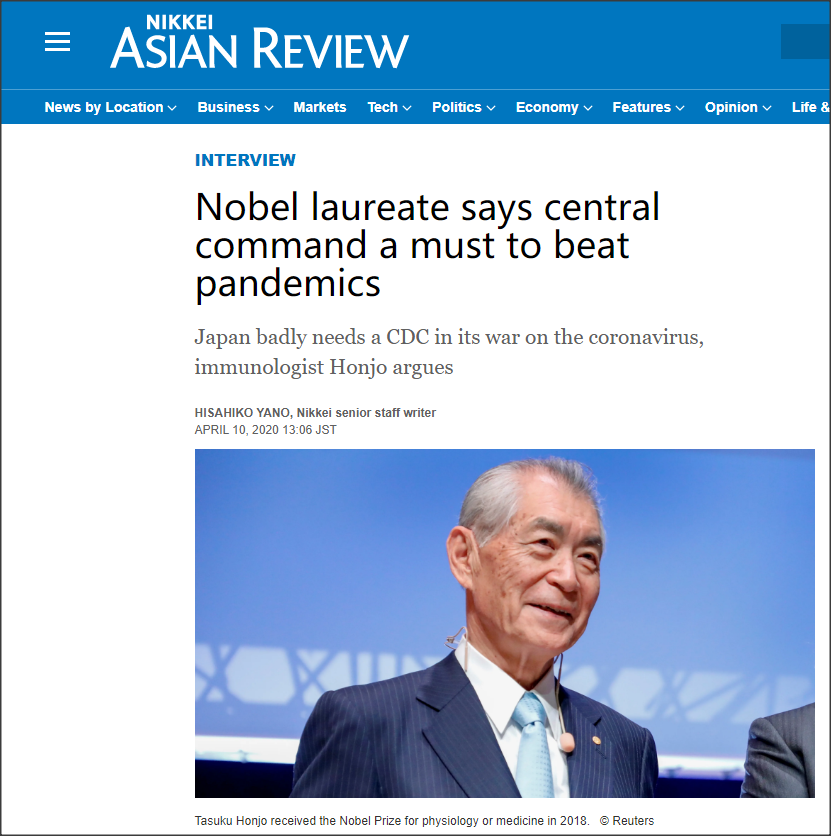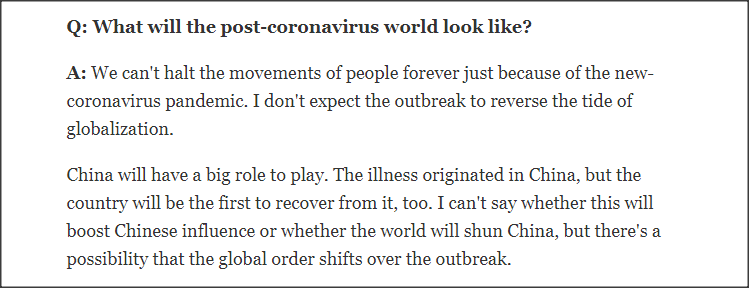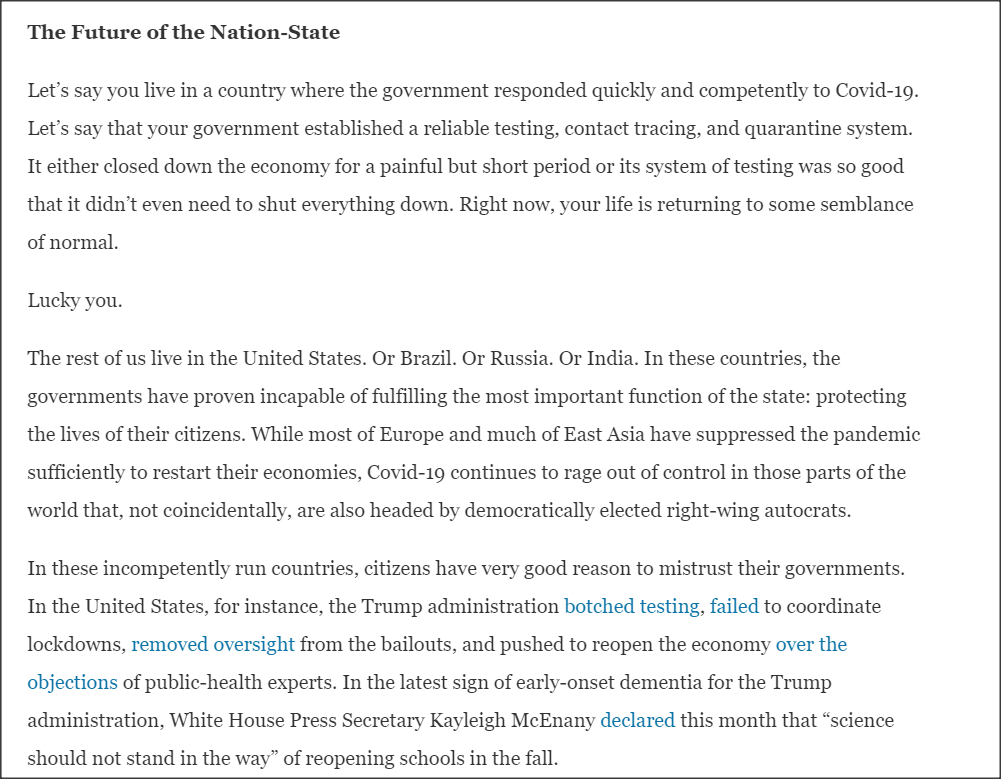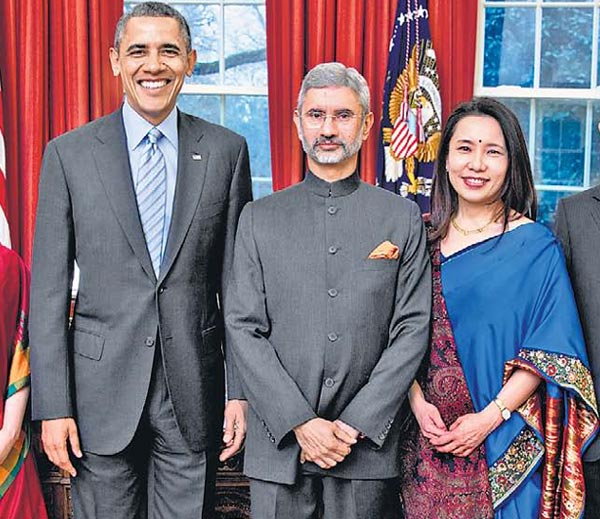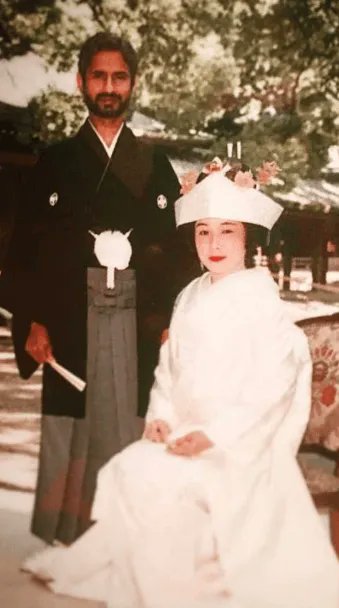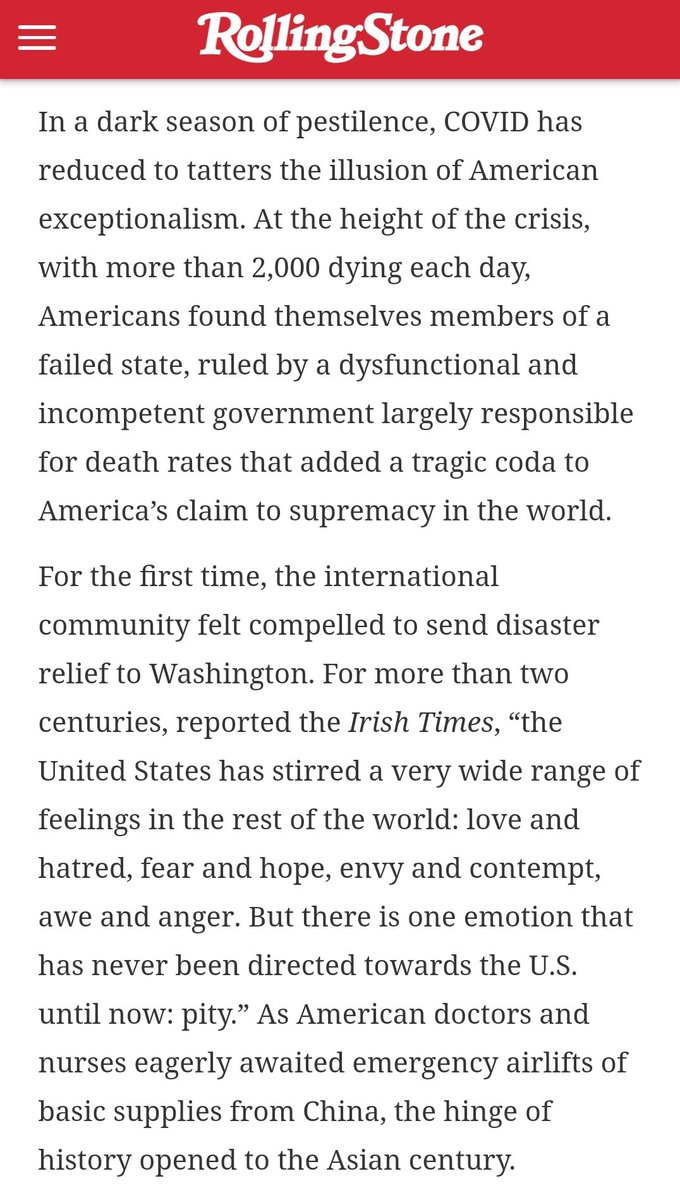Tasuku Honjo (本庶佑), who won the 2018 Nobel Prize in Medicine or Physiology, tells Nikkei while it's hard to predict, China's place in the world will change significantly,
https://cn.nikkei.com/columnviewpoint/viewpoint/40149-2020-04-13-05-00-00.html
https://cn.nikkei.com/columnviewpoint/viewpoint/40149-2020-04-13-05-00-00.html
English version,
https://asia.nikkei.com/Editor-s-Picks/Interview/Nobel-laureate-says-central-command-a-must-to-beat-pandemics
https://asia.nikkei.com/Editor-s-Picks/Interview/Nobel-laureate-says-central-command-a-must-to-beat-pandemics
» Japan Nobel laureate Tasuku Honjo denies rumors on him saying China manufactured Covid-19 | The Star https://www.thestar.com.my/news/regional/2020/05/07/japan-nobel-laureate-denies-rumors-on-him-saying-china-manufactured-covid-19
In the face of a global recession, China looks set to be one of the few countries that will expand, economically and politically. https://www.cnbc.com/2020/06/01/after-coronavirus-chinas-economy-looks-set-to-grow-as-world-braces-for-contraction.html
According to the latest IMF projections, China is set to grow just over 1% in 2020, while the U.S. economy will likely contract nearly 6% this year.
"We don't want to leave China," Jörg Wuttke, President of the European Chamber of Commerce in China, said in a phone call.
"That's why we engage more with China and ask for more."
"That's why we engage more with China and ask for more."
Whatever the election result, the United States’ deep polarization is likely to remain. https://www.foreignaffairs.com/articles/world/2020-06-09/pandemic-and-political-order?utm_medium=social
"Holding an election during a pandemic will be tough, and there will be incentives for the disgruntled losers to challenge its legitimacy.
Even should the Democrats take the White House and both houses of Congress, they would inherit a country on its knees."
Even should the Democrats take the White House and both houses of Congress, they would inherit a country on its knees."
An emphasis on greater economic self-reliance began after 2010, but the impetus created by the pandemic is seeing this shift implemented more resolutely and decisively, https://www.eastasiaforum.org/2020/07/02/covid-19-accelerates-chinas-political-economic-transformation/
“Exports still account for 30 per cent of China’s GDP, making it impossible to shield the country from shocks beyond its borders.
Yet, domestic consumption has risen and is now the most important driver of growth.”
Yet, domestic consumption has risen and is now the most important driver of growth.”
“The economic shocks created by the pandemic are crippling global commerce to such an extent that external demand for Chinese exports might not recover for two or three years. ”
Private tech giants such as Huawei, Alibaba, Tencent and SenseTime are expected to drive this new infrastructure initiative with few benefits for US companies.
Many international recipients of Chinese loans under the BRI are experiencing severe economic downturns, making defaults on these loans highly likely and putting a crimp on new BRI projects.
“If the Chinese government’s new development model succeeds, China could function less as the ‘factory of the world’ and more as the continent-sized consumer market Western marketers have been dreaming about for over 200 years.”
According to Gallup’s latest survey,
only
11% of Americans now trust Congress,
23% big business and newspapers,
24% the criminal justice system,
29% the public school system,
36% the medical system, and
38% the presidency.
only
11% of Americans now trust Congress,
23% big business and newspapers,
24% the criminal justice system,
29% the public school system,
36% the medical system, and
38% the presidency.
The only institution a significant majority of Americans trust — and consider this an irony, given America’s endless twenty-first-century wars — is the military (73%).
"In this pandemic era, a fire somewhere is a fire everywhere, for the virus cares nothing about borders.
But the key to restoring trust must begin where the trust deficit has grown largest and that certainly is the United States. "
But the key to restoring trust must begin where the trust deficit has grown largest and that certainly is the United States. "
"Restoring trust in this country’s public health system and governance must begin with a competent system of testing, contact tracing, and quarantine.
Yet the Trump administration still refuses to take this necessary step. "
Yet the Trump administration still refuses to take this necessary step. "
"The next administration (assuming there is one) will have a massive clean-up job restoring faith of any sort in such an unequal, broken system.
After addressing the acute crisis of the pandemic, it will have to demonstrate that the rule of law is again functioning. "
After addressing the acute crisis of the pandemic, it will have to demonstrate that the rule of law is again functioning. "
"If the United States has barely survived, has China thrived? Not really. Brussels will always be the tortoise in any response to a global crisis. " @dandrezner https://www.washingtonpost.com/outlook/2020/07/28/tortoise-21st-century-great-power-politics/
S. Jaishankar » India and the emerging world: The impact on the global order of China’s rise will be visible over the next generation https://timesofindia.indiatimes.com/blogs/toi-edit-page/india-and-the-emerging-world-the-impact-on-the-global-order-of-chinas-rise-will-be-visible-over-the-next-generation/
"For two decades, China had been winning without fighting, while the US was fighting without winning.
In the ultimate analysis, the ability of major powers to reach accommodation will shape our times."
In the ultimate analysis, the ability of major powers to reach accommodation will shape our times."
"The rise of a new global power was never going to be easy, and an order waiting to happen will look like chaos till it does."
"Even if ties between China and the West take on a more adversarial character, it is difficult to return to a strongly bipolar world.
The primary reason for that is the landscape has now changed irreversibly."
The primary reason for that is the landscape has now changed irreversibly."
For over centuries, the US has stirred a very wide range of feelings in the rest of the world: love and hatred, fear and hope, envy and contempt, awe and anger.
But there is one emotion that has never been directed towards the US until now: pity.
https://www.rollingstone.com/politics/political-commentary/covid-19-end-of-american-era-wade-davis-1038206/
But there is one emotion that has never been directed towards the US until now: pity.
https://www.rollingstone.com/politics/political-commentary/covid-19-end-of-american-era-wade-davis-1038206/
In 1940, with Europe already ablaze, the United States had a smaller army than either Portugal or Bulgaria.
Within four years, 18 million men and women would serve in uniform, with millions more working double shifts in mines and factories that made America.
Within four years, 18 million men and women would serve in uniform, with millions more working double shifts in mines and factories that made America.
When Japan within six weeks of Pearl Harbor took control of 90% of the world’s rubber supply, the U.S. dropped the speed limit to 35 mph to protect tires, and then, in 3 years, invented from scratch a synthetic-rubber industry that allowed Allied armies to roll over the Nazis.
At its peak, Henry Ford’s Willow Run Plant produced a B-24 Liberator every two hours, around the clock.
Shipyards in Long Beach and Sausalito spat out Liberty ships at a rate of two a day for four years; the record was a ship built in four days, 15 hours and 29 minutes.
Shipyards in Long Beach and Sausalito spat out Liberty ships at a rate of two a day for four years; the record was a ship built in four days, 15 hours and 29 minutes.
In the wake of the war, with Europe and Japan in ashes, the United States with but 6% of the world’s population accounted for half of the global economy, including the production of 93% of all automobiles.
But freedom and affluence came with a price.
The United States, virtually a demilitarized nation on the eve of the Second World War, never stood down in the wake of victory.
To this day, American troops are deployed in 150 countries.
The United States, virtually a demilitarized nation on the eve of the Second World War, never stood down in the wake of victory.
To this day, American troops are deployed in 150 countries.
President Jimmy Carter recently noted that in its 242-year history, America has enjoyed only 16 years of peace, making it, as he wrote, “the most warlike nation in the history of the world.”
Since 2001, the U.S. has spent over $6 trillion on military operations and war, money that might have been invested in the infrastructure of home.
China, meanwhile, built its nation, pouring more cement every three years than America did in the entire 20th century.
China, meanwhile, built its nation, pouring more cement every three years than America did in the entire 20th century.
As America policed the world, the violence came home.
On D-Day, June 6th, 1944, the Allied death toll was 4,414; in 2019, domestic gun violence had killed that many American men and women by the end of April.
On D-Day, June 6th, 1944, the Allied death toll was 4,414; in 2019, domestic gun violence had killed that many American men and women by the end of April.
More than any other country, the United States in the post-war era lionized the individual at the expense of community and family.
It was the sociological equivalent of splitting the atom.
It was the sociological equivalent of splitting the atom.
What was gained in terms of mobility and personal freedom came at the expense of common purpose.
In wide swaths of America, the family as an institution lost its grounding.
In wide swaths of America, the family as an institution lost its grounding.
With slogans like “24/7” celebrating complete dedication to the workplace, men and women exhausted themselves in jobs that only reinforced their isolation from their families.
Only half of Americans report having meaningful, face-to-face social interactions on a daily basis.
The nation consumes two-thirds of the world’s production of anti-depressant drugs.
The nation consumes two-thirds of the world’s production of anti-depressant drugs.
The collapse of the working-class family has been responsible in part for an opioid crisis that has displaced car accidents as the leading cause of death for Americans under 50.
At the root of this transformation lies an ever-widening chasm between the haves and have-nots.
At the root of this transformation lies an ever-widening chasm between the haves and have-nots.
The elite one percent of Americans control $30 trillion of assets, while the bottom half have more debt than assets.
The three richest Americans have more money than the poorest 160 million of their countrymen.
Fully a fifth of American households have zero or negative net worth, a figure that rises to 37% for black families.
Though living in a nation that celebrates itself as the wealthiest in history, most Americans live on a high wire, with no safety net to brace a fall.
With the COVID crisis, 40 million Americans lost their jobs, and 3.3 million businesses shut down, including 41 percent of all black-owned enterprises.
Achieving the world’s highest rate of morbidity and mortality provoked not shame, but only further lies, scapegoating, and boasts of miracle cures as dubious as the claims of a carnival barker, a grifter on the make.
Their political process made possible the ascendancy to the highest office in the land a national disgrace, a demagogue as morally and ethically compromised as a person can be.
As a British writer quipped, “there have always been stupid people in the world, and plenty of nasty people too. But rarely has stupidity been so nasty, or nastiness so stupid”.
If America’s first president, George Washington, famously could not tell a lie, the current one can’t recognize the truth.
Inverting the words and sentiments of Abraham Lincoln, this dark troll of a man celebrates malice for all, and charity for none.
Inverting the words and sentiments of Abraham Lincoln, this dark troll of a man celebrates malice for all, and charity for none.
Odious as he may be, Trump is less the cause of America’s decline than a product of its descent.
As they stare into the mirror and perceive only the myth of their exceptionalism, Americans remain almost bizarrely incapable of seeing what has actually become of their country.
As they stare into the mirror and perceive only the myth of their exceptionalism, Americans remain almost bizarrely incapable of seeing what has actually become of their country.
The republic that defined the free flow of information as the life blood of democracy, today ranks 45th among nations when it comes to press freedom.
What every prosperous and successful democracy deems to be fundamental rights — universal health care, equal access to quality public education, a social safety net for the weak, elderly, and infirmed — America dismisses as socialist indulgences, as if so many signs of weakness.
Those who flock to beaches, bars, and political rallies, putting their fellow citizens at risk, are not exercising freedom; they are displaying the weakness of a people who lack both the stoicism to endure the pandemic and the fortitude to defeat it.
For every person who has died in British Columbia, 44 have perished in Massachusetts, a state with a comparable population that has reported more COVID cases than all of Canada.

 Read on Twitter
Read on Twitter